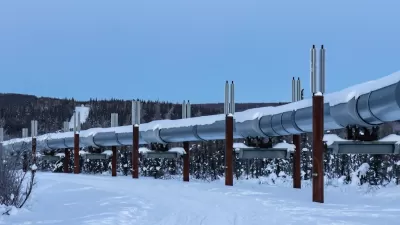Biden is amping up his campaign promises to leverage the federal government in the fight to reduce greenhouse emissions in the U.S. economy.

"On Tuesday, Biden unveiled a new climate plan that expands on his initial proposal by spending $2 trillion over four years instead of $1.7 over a decade," reports Zoya Teirstein.
"It calls for getting rid of all emissions from the electricity sector by 2035, creating a million new jobs building electric vehicles and charging stations, retrofitting existing buildings and constructing new ones to make the housing sector energy efficient, and ensuring that 40 percent of the benefits of this spending on green initiatives goes to disadvantaged communities," explains Teirstein.
Among some smaller pieces of the climate plan are several programs intersecting with the interest of planners, including promises to invest in plans and infrastructure that prioritizes bikes, pedestrians, and micromobility.
Additional news coverage of Biden's new climate plan is available at Smart Cities Dive, NPR, New York Magazine, and the Associated Press. An opinion piece saying the plan would be a disaster for workers and the economy needs the kinds of deregulation pursued by the Trump Administration, is available on Fox Business.
FULL STORY: 3 unexpected ways Joe Biden plans to tackle climate change

Maui's Vacation Rental Debate Turns Ugly
Verbal attacks, misinformation campaigns and fistfights plague a high-stakes debate to convert thousands of vacation rentals into long-term housing.

Planetizen Federal Action Tracker
A weekly monitor of how Trump’s orders and actions are impacting planners and planning in America.

In Urban Planning, AI Prompting Could be the New Design Thinking
Creativity has long been key to great urban design. What if we see AI as our new creative partner?

King County Supportive Housing Program Offers Hope for Unhoused Residents
The county is taking a ‘Housing First’ approach that prioritizes getting people into housing, then offering wraparound supportive services.

Researchers Use AI to Get Clearer Picture of US Housing
Analysts are using artificial intelligence to supercharge their research by allowing them to comb through data faster. Though these AI tools can be error prone, they save time and housing researchers are optimistic about the future.

Making Shared Micromobility More Inclusive
Cities and shared mobility system operators can do more to include people with disabilities in planning and operations, per a new report.
Urban Design for Planners 1: Software Tools
This six-course series explores essential urban design concepts using open source software and equips planners with the tools they need to participate fully in the urban design process.
Planning for Universal Design
Learn the tools for implementing Universal Design in planning regulations.
planning NEXT
Appalachian Highlands Housing Partners
Mpact (founded as Rail~Volution)
City of Camden Redevelopment Agency
City of Astoria
City of Portland
City of Laramie





























